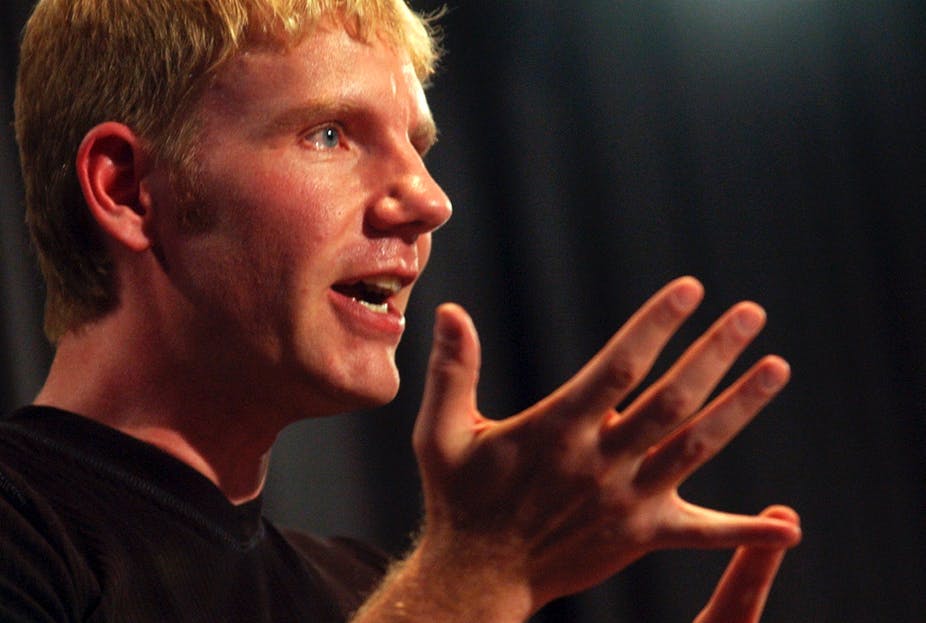With much-cited forecasts that the year 2050 will see 200 million climate change refugees around the world, climate inactivist Bjorn Lomborg may qualify as Australia’s first climate asylum seeker. Yet it is not scorching temperatures or sea level rise he is seeking refuge from, but the political heat he attracts worldwide for his contrarian views on climate.
The second rejection of a Bjorn-again “Consensus Centre” by an Australian university this week raises questions as to whether any university would ever go near Lomborg, even if the federal government is putting up A$4 million to host him. These millions were allocated to Lomborg in the 2015 budget.
The University of Western Australia backflipped on a decision to host the centre in May. And now Flinders University has solidly refused to establish an Australia Consensus Centre for Lomborg.
Lomborg has been rendered virtually “stateless” as a political actor on climate since being defunded by the Danish government in 2012. He then moved his focus to the United States where he was able to attract considerable private funding for an operation known as the Copenhagen Consensus Centre (CCC), based in Massachusetts.
An image of the so-called centre, which was actually operating from a parcel service in Lowell, Massachusetts, was doing the rounds on Twitter last year as part of the campaign against Lomborg’s presence on US soil.
While the “centre” was operating out of Massachusetts, Lomborg was actually living in Prague and reportedly travelling up to 200 days per year. He drew on the US$775,000 the CCC paid him in 2012 and US$200,484 in 2013.
But without a regular salary to back his globetrotting activities, Lomborg has been seeking to replicate his US funding here.
Education Minister Christopher Pyne pledged his determination to find a university home for Lomborg. This brought him back to his home town of Adelaide and negotiations with Flinders University.
Doubtless, there will be a new spike in outrage from conservative commenters over Lomborg’s homelessness. A campaign to give Lomborg’s centre university legitimacy has been hosted by the right-wing think tank Menzies House, which has sought to make it an “academic freedom” issue. It called on supporters in May to fund full-page newspaper advertisements, to:
… stand with Dr Lomborg.
“Academic censorship will NOT be tolerated,” Tim Andrews from Menzies House tells his readers. Pyne sought to characterise the Lomborg rejections as a freedom of speech issue. Former Institute of Public Affairs staffer and current Human Rights Commissioner Tim Wilson, labelled it “soft-censorship” in an article in The Australian.
In defence of Lomborg, the original UWA proposal was to look at a centre that would concentrate primarily on spending programs for the developing world, and the charge is that he was ousted from the university for his views on climate change.
Even if this were true, however, how would conservatives defend the charge that the abolition of the Climate Commission, or the sacking of Treasury secretary Martin Parkinson, were not simply forms of censorship of groups and individuals for their views and perspectives on climate change?
As noted previously, Lomborg’s policy ideas on climate change have had considerable influence on the Abbott government’s strategies for doing as little as possible to decarbonise the economy.
Many of Lomborg’s arguments are familiar in the rhetoric of the Coalition’s pronouncements:
That renewables are not up to the job of providing baseload;
That renewables will supposedly lead to electricity price rises;
That there are much more important problems that Australia could fund than climate change; or
That exporting coal will help lift developing countries out of poverty.
The Coalition’s enthusiasm for Lomborg coincides with the decline of the intellectual right in Australia. The latter development is most lamentable for Australian politics. It has deprived Australia of the kinds of constructive debates that were once possible across the political spectrum.
Instead, what we now have is a Coalition captive to the mental life of a tabloid front page. Labor is trying to avoid the same front page, while at the same time failing to get its message out.
An earlier version of this article stated that Dr Lomborg was unable to find a US university to host the Copenhagen Consensus Center. A spokesperson for the Center says that the CCC has never sought a US host university, so this sentence has been amended.

